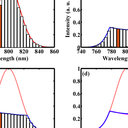Anti-inflammatory effect of Yam Glycoprotein on lipopolysaccharide-induced acute lung injury via the NLRP3 and NF-κB/TLR4 signaling pathway.
Mo kle
Abstrè
Acute lung injury (ALI) is a common lung disease accompanied by acute and persistent pulmonary inflammatory response syndrome, which leads to alveolar epithelial cells and capillary endothelial cell damage. Yam glycoprotein, separated from traditional Chinese yam, has been shown to have anti-inflammatory and immunomodulatory effects. In this experiment, we mainly studied the therapeutic effect and mechanism of a glycoprotein on the lipopolysaccharide (LPS)-induced ALI mice. An oral glycoprotein method was used to treat the mouse ALI model induced by LPS injection in the peritoneal cavity. Afterward, we measured the wet/dry (W/D) ratio, the activity of myeloperoxidase (MPO), the oxidative index superoxide dismutase (SOD), malondialdehyde (MDA), glutathione peroxidase (GSH-PX) and the production of inflammatory cytokines interleukin-1β (IL-1β), tumour necrosis factor-α (TNF-α), and interleukin-6 (IL-6) to evaluate the effect of yam glycoprotein on lung tissue changes. We examined the protein expression of TLR4, ASC, NF-κBp65, p-NF-κBp65, Caspase-1, IκB, NLRP3, p-IκB, and β-actin by western blot analysis. Immunohistochemical analyses of NLRP3 and p-p65 in lung tissue were carried out to assess the mechanism of glycoprotein action. This result suggests that glycoprotein markedly depressed LPS-induced lung W/D ratio, MPO activity, MDA content SOD and GSH-Px depletion, and the contents of inflammatory cytokines IL-1β, IL-6, and TNF-α. Moreover, glycoprotein blocked TLR4/NF-κBp65 signaling activation and NLRP3inflammasome expression in LPS-induced ALI mice. As this particular study shows, glycoprotein has a safeguarding effects on LPS-induced ALI mice, possibly via activating NLRP3inflammasome and TLR4/NF-κB signaling pathways.



